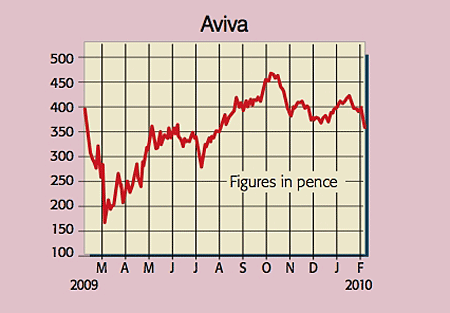Get the latest financial news, insights and expert analysis from our award-winning MoneyWeek team, to help you understand what really matters when it comes to your finances.
You are now subscribed
Your newsletter sign-up was successful
Want to add more newsletters?

Twice daily
MoneyWeek
Get the latest financial news, insights and expert analysis from our award-winning MoneyWeek team, to help you understand what really matters when it comes to your finances.

Four times a week
Look After My Bills
Sign up to our free money-saving newsletter, filled with the latest news and expert advice to help you find the best tips and deals for managing your bills. Start saving today!
A major indicator that the FTSE might plummet again is a strengthening dollar. Over the past month the dollar has broken through two key resistance levels against the euro and sterling. So for now I prefer high-quality firms with sound balance sheets and a cheap share price.
Enter Aviva, the world's fifth-largest insurer. The firm derives around 70% of its income from outside Britain and so will benefit should the pound lurch down again. The group's main activities are long-term savings (80% of sales) and general insurance (20%). These are all made under the Aviva brand name after the firm ditched smaller ones, such as Norwich Union, last year.
Unlike some rivals, Aviva did not have to resort to a rights issue to boost its capital base during the credit crunch. It started 2009 with £2bn more capital than the minimum regulatory requirement. By December that had been boosted to a hefty £4.5bn, thanks to a bounce in corporate bonds, the disposal of its Australian life business for £450m and the flotation of Delta Lloyd (58% owned) for gross proceeds of £1.03bn. Moreover, there is another £1.1bn stashed away as a rainy-day fund in the form of a default provision against its UK annuity book.
MoneyWeek
Subscribe to MoneyWeek today and get your first six magazine issues absolutely FREE

Sign up to Money Morning
Don't miss the latest investment and personal finances news, market analysis, plus money-saving tips with our free twice-daily newsletter
Don't miss the latest investment and personal finances news, market analysis, plus money-saving tips with our free twice-daily newsletter
Aviva (LSE: AV), rated OUTPERFORM by Keefe, Bruyette & Woods

Aviva's CEO, Andrew Moss, updated the City last week, saying that fourth-quarter 2009 life and pension sales had jumped an impressive 21% over the previous quarter. Despite being hit by £100m of losses from the autumn flooding, I estimate the firm's year-end embedded value (the main measure of profitability across the industry because it adjusts net assets for the expected long-term returns on policies already written) to be about 530p a share. After being cut by a third, the dividend should come in at 21.7p. That offers income-seekers a 5.5% yield.
Aviva plans to exploit its immense scale by cross-selling products in different territories and by closing offices and making redundancies in order to reduce its overheads by another £261m a year. Reassuringly, Moss said that he is "cautiously optimistic" that the worst is behind Aviva, which "starts 2010 in a strong position". Analysts have pencilled in 2010 and 2011 underlying earnings per share (EPS) of 66.0p and 72.5p. This puts the stock on a price/earnings (p/e) ratio of less than six.
There are potential potholes ahead. These include the group's exposure to investment portfolio volatility; life expectancy assumptions; counterparty risk and the forthcoming proposals to increase capital requirements under Europe's Solvency II rules.
However, with the stock already trading at a 30% discount to embedded value, these concerns are more than priced in. Indeed, if the markets dive again, I could even see the group benefiting as institutional investors scale back risk, dump hedge funds and migrate to cheaper, less volatile and more transparent fund managers. Keefe, Bruyette & Woods has a target price of £6.28 with preliminary results due out on 4 March.
Recommendation: BUY at 361p
Paul Hill also writes a weekly share-tipping newsletter, Precision Guided Investments
Get the latest financial news, insights and expert analysis from our award-winning MoneyWeek team, to help you understand what really matters when it comes to your finances.
Paul gained a degree in electrical engineering and went on to qualify as a chartered management accountant. He has extensive corporate finance and investment experience and is a member of the Securities Institute.
Over the past 16 years Paul has held top-level financial management and M&A roles for blue-chip companies such as O2, GKN and Unilever. He is now director of his own capital investment and consultancy firm, PMH Capital Limited.
Paul is an expert at analysing companies in new, fast-growing markets, and is an extremely shrewd stock-picker.
-
 Should you buy an active ETF?
Should you buy an active ETF?ETFs are often mischaracterised as passive products, but they can be a convenient way to add active management to your portfolio
-
 Power up your pension before 5 April – easy ways to save before the tax year end
Power up your pension before 5 April – easy ways to save before the tax year endWith the end of the tax year looming, pension savers currently have a window to review and maximise what’s going into their retirement funds – we look at how